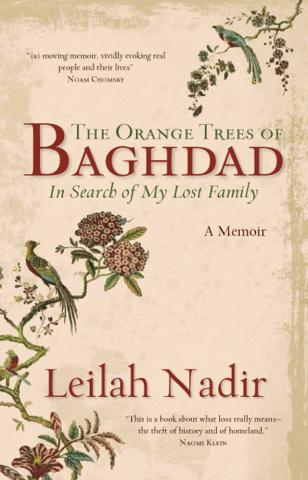Long overdue, the United Kingdom finally sees the publication of the Iraqi-Canadian Leilah Nadir’s book: ‘The Orange Trees of Baghdad: In Search of My Lost Family’. As the UK was one of the prime architects of the Iraqi Invasion in 2003 – an event that irreversibly transformed the author’s life – it seems right that people here should have access to her story.
‘The Orange Trees of Baghdad’ is the memoir of a 32-year-old woman who felt compelled by circumstances beyond reason and control to question her father’s Iraqi and Syrian ancestral roots after decades of nothing but silence coming from him. Although Nadir’s father was born and brought up in Baghdad, Iraq and had four children half-carrying the Arab gene, he never volunteered much information about his home country and was almost in denial about it, content to have initiated a new life in the West and not wanting to look back.
But a week into the unjustified March 2003 Invasion of Iraq, father and daughter are on a plane journey from Vancouver, Canada to London to visit the three paternal aunts; when she begins to ask him some very uncomfortable questions about Iraq that he finally begins to open up and respond.
‘The Orange Trees of Baghdad’ received the George Rygan Award for Social Awareness In British Colombia (BC) Literature in 2008 and has already been published and translated in Canada, Australia, New Zealand, Italy, Turkey and France.
Propelled by and intrigued with the answers, Nadir initiates a fuller search of his background, the extended family and friends he’d left behind decades earlier when he was just 16 years old; a young boy who once left but was never able to return even up until now.
In reconnecting with what was lost from years before, Nadir finds a warm, kind, generous and sincere people who hold the key to a Pandora’s box. On an emotional journey, she learns the ugly truth about the Iraq Wars and the tragic plight of its people held captive due to a trick historical passage of time.
The more Nadir probes, the more she learns of the awesomely heavy toll endured by her relatives; both those existing in exile and the others who had no option but to remain in Baghdad and experience firsthand the horrors of the invasion and its aftermath; as well as having been through years of oppression under Saddam Hussein and plenty more strife.
Nadir’s experience of digging deep and taking the brave decision to directly communicate with her estranged family during the war starts to affect and trouble her psyche. In fact, she ends up with a newborn Iraqi-Syrian identity and becoming the genuine offspring of an Arab ancestry; she can no longer help but to adopt and feel their losses and grieve for their dead. In her special way, she compiled and wrote the book as a testimony document that honours her relatives and that can one day be passed further down the family line.
She writes: “Now, as I watch this war, it is as if one part of me is invading the other. I feel like this war is between two cultures whose blood flows in me, and it makes the experience entirely different.. To look at me is to look at both the aggressor and the victim. I am both the enemy and the ally.”
Although the actual timescale of the book is from 2003 to just before the first publication in Canada in 2007 – and that Nadir goes all the way back to the Baghdad of her father’s childhood to bring out the nostalgia for that bygone age as well – this book is a timeless tribute to the power of family ties and the compassionate love that surpasses generations even when there is a big geographical divide.
Now ten years have passed since the beginning of the 2003 Invasion and Nadir has added an Epilogue for the UK publication that updates on some of the characters and stories in the book; and, fortunately, it offers some glimmer of relief, hope and light for them.
Turning over the last page of ‘The Orange Trees of Baghdad’, one is left with very strong feelings about the injustices wrought upon not just Nadir’s family – but the millions more of Iraqis – from the inside and outside. One has to wonder when the tragedy might come to an end; because, even for those who have managed to physically escape, the psychological trauma is still carried within their heavy broken hearts. And, sadly, the prospect of a happy return is still not nigh.
There is also the Nahla Ink Interview with Leilah Nadir: https://www.nahlaink.com/interviews/leilah-nadir-iraqi-canadian-author.
Note: This articles was first published circa March 2014


